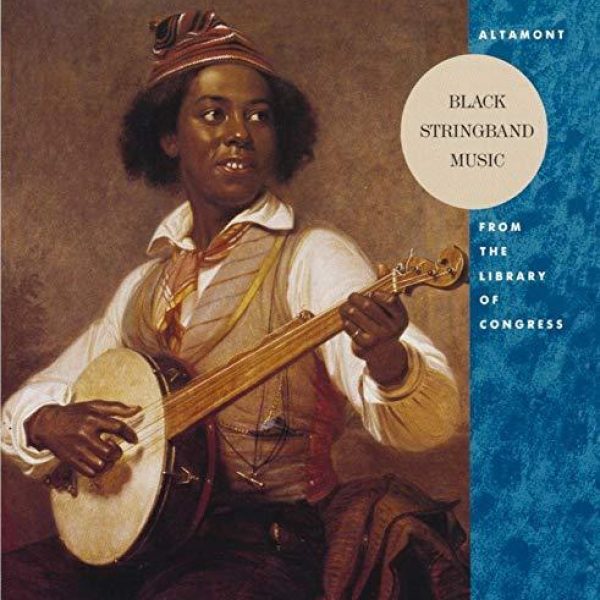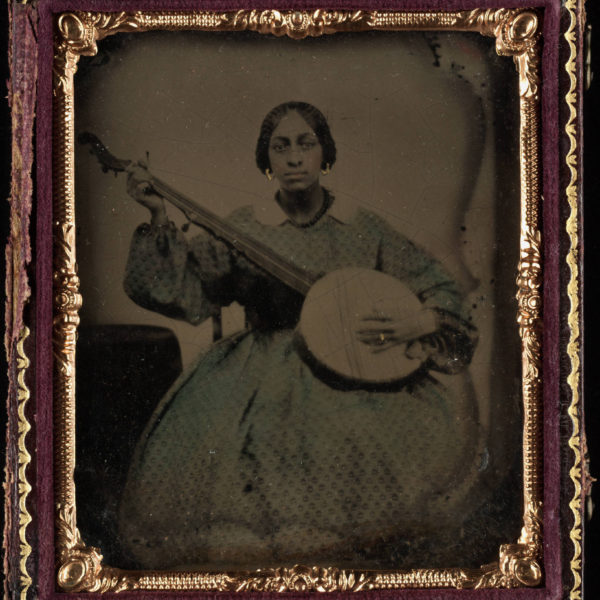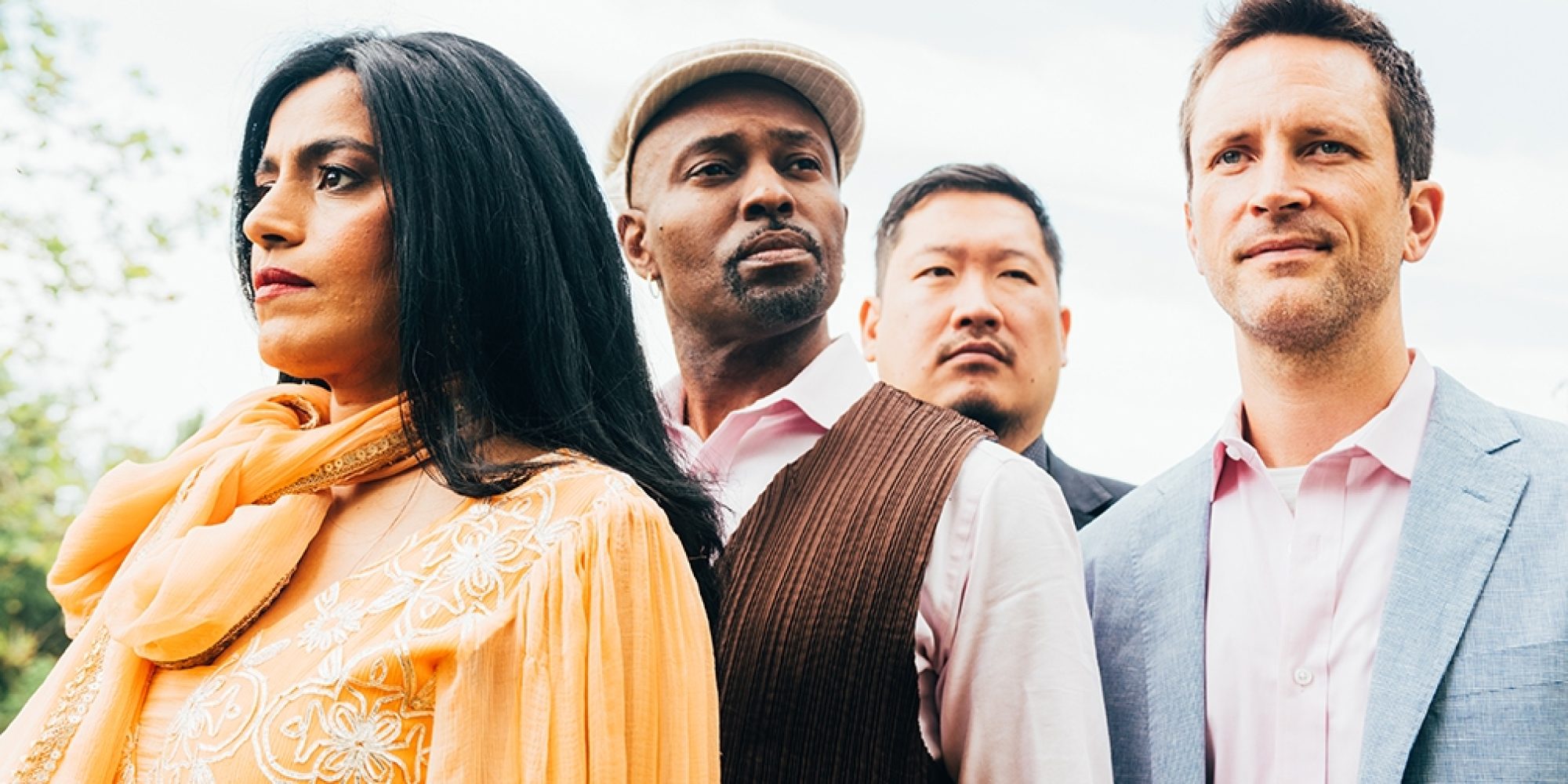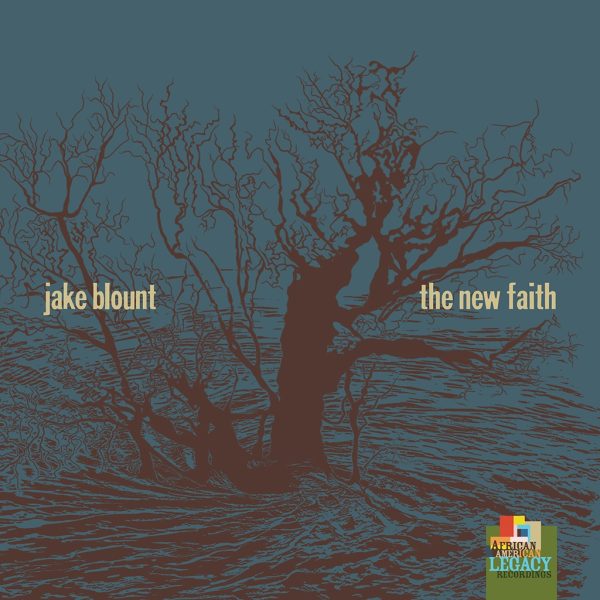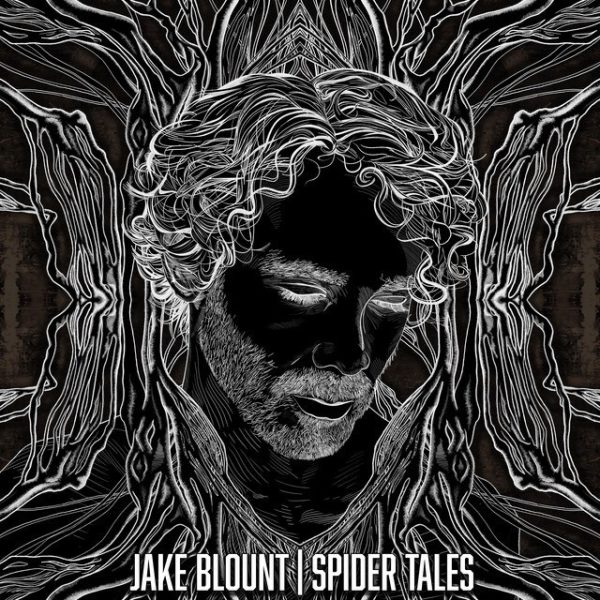Guitarist/singer/bandleader Clay Ross has a new project called the American Patchwork Quartet. But people will know him better for the Grammy Award winning band he co-founded back in 2017, Ranky Tanky. That group creates inspired reimaginings of Gullah songs from the Georgia and Carolina sea islands. All the members, save Ross, share Gullah ancestry. Here, the scope is broader. Collaborating with a classically trained Indian vocalist, an American jazz drummer and a Japanese bass player, Clay once again takes on classic American songs in an entirely new way. APQ’s eponymous debut offers a revelatory tour through 14 old tunes, some familiar, others not, but all reworked with catchy grooves, and surprising vocal arrangements. Afropop’s Banning Eyre called Ross to speak about the project. Here’s their conversation.
Banning Eyre: Clay, how are things going?
Clay Ross: Well, I’m just hanging out here in my Brooklyn apartment. I’ve got some days off before hitting the road again with the American Patchwork Quartet.
We've talked about in the past about Ranky Tanky. As you know, I’m a huge fan. This is a more eclectic project. So how did you get from Ranky Tanky to the American Patchwork Quartet?
Yeah, good question. Ranky Tanky definitely provided me an opportunity to focus in on where I'm from. I was born in South Carolina and all of my bandmates are descendants of Gullah culture, and they just happen to be some of the most important mentors for me in music. They're the musicians I learned to play with when I was coming out of high school. I met them my first day of college. I was 17 years old and the guys in Rinky Tanky really were a huge inspiration to me. I didn't really know a lot about the Gullah culture from an academic perspective, but they imbibed that music and Gullah sensibilities into everything they were doing playing jazz music.
Exploring different styles of music is something I've always been interested in. Before Ranky Tanky, I had a group called Matuto and we called our music Brazilian Bluegrass. The first break that I ever caught when I moved to New York was playing with Brazilian percussionist Cyro Baptista. And man, Cyro’s music is incredibly eclectic. I've always been into that type of thing. With Ranky Tanky, there's a lot of eclectic influence as well. It's a little bit masked in the fact that Gullah is an informant to so many different styles of music. Gullah music has informed jazz, has informed rock music, has informed country music and gospel—so many forms in the American vernacular. So we can call something that we do Gullah, even though it has overtones of country or overtones of rock ‘n roll. However it might be framed, at the root of it is that Gullah beat.
And so with American Patchwork Quartet, we definitely have a much more broad perspective. It’s a more artistic interpretation, my reading, or our reading as a band, of American roots music and traditional Appalachian folk music. We wanted to do it in our own way and do it in a way that reflects New York's diversity. New York, you know, is itself a crazy diverse place.
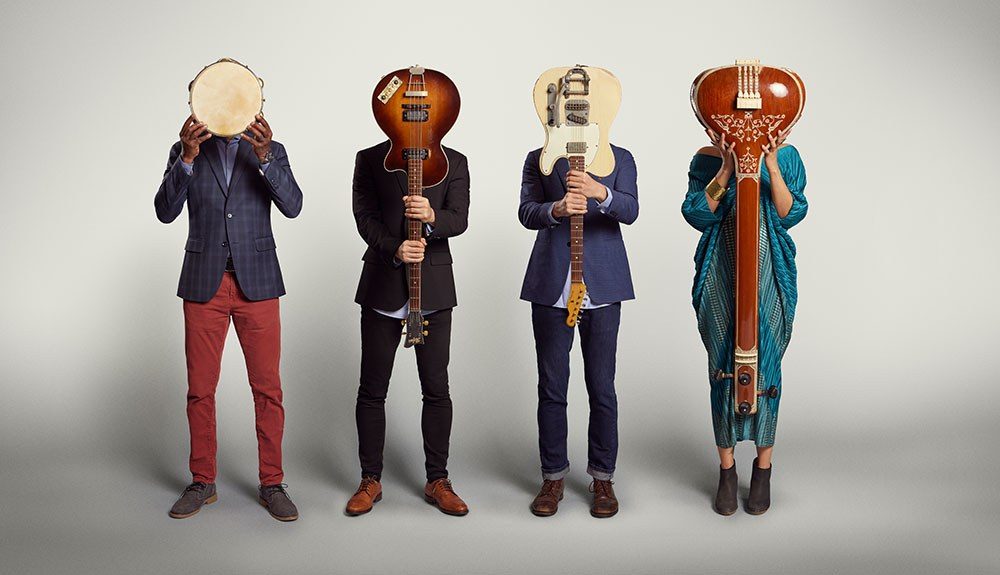
That’s for sure. Before we get the back story, why don't you just describe the group?
American Patchwork Quartet is myself and vocalist Falu, otherwise known as Falguni Shah, drummer Clarence Penn, who's worked with Michael Brecker, Maria Schneider, Betty Carter, so many jazz legends, and the amazing bassist, Yasushi Nakamura, who's currently out on the road with Cécile McLorin Salvant and worked with Wynton Marsalis and so many jazz luminaries. He's a real rising star on the jazz bass. I knew those guys from coming to New York and trying to pursue jazz music, but my path got sort of diverted when I got called to work in Cyro Baptista's band.
That opened me up to more global sounds and world music and then I got interested in my own roots music, and with me being from the South, there's a lot to dig into there. Now this group is an effort to bring diversity and representation to American roots music and share that on stages, not only through the music that we make and our different influences, but also from our very visual presence. We have an African -American drummer from Detroit, a Japanese bassist originally from Tokyo, Japan. Our vocalist, Falu, imbues these Appalachian ballads with her own Hindustani vocal training.
Yes. Talk about that. It’s evident that she's a skilled Indian vocalist. What is her training?
She’s an 11th generation student of a very specific strain of Hindustani classical vocal music. She can speak much more specifically on all the nuances of her training, but it is very much an oral training. She studied intensely with her guru to learn this specific style where they have microtonal notes. It blows my mind because I'll play music for her something like, you know, the blues singing of Blind Willie Johnson, and she'll hear the microtone but she'll have a name for it. She has a name that her guru taught her. So she has very specific ornaments
Indian music is amazing that way. I studied it a little when I was in college at Wesleyan University. It’s interesting to hear those ornaments in this setting.
Everything she did on this album is heavily arranged in her own style. This album was made with a lot of care, a lot of attention, a lot of energy. It took us years to arrive at the sound we finally were able to record.
Most of the songs on this record are part of the American roots traditional music canon, right? And, some are very familiar, like “Wayfaring Stranger.” Or “Shenandoah” where Falu does this extended vocal introduction, really cutting loose with those ornamentations and creating this mood so that when we hear that familiar melody, we hear it in a whole new way.
That one really stood out for all of us. You know, this whole process started with songs that I collected for Ranky Tanky. When I was curating songs for that project, I was looking for Gullah music specifically. But then I encountered this whole world of songs outside of Gullah that wouldn't necessarily fit with the Ranky Tanky project, but they were songs I really loved from the wider American canon, as you said. So, you know, I shared some of those songs with Falu when we were working together as teaching artists at Carnegie Hall. We got to hang out a lot, and I would play these songs for her. And yeah, right away, “Shenandoah” was one where she just said, “My God, that's such a gorgeous melody!”
And I said, “Well, I want you to do your own thing with it. Take that and find the connection between your tradition and this melody.” And I think she did an amazing job.
It's beautiful.
For me, the sound of your two voices is the centerpiece of the album. Of course, the rhythm section is awesome. Throughout, you’ve got really rocking songs, and you’ve got beautiful slow songs. The variety of grooves is wonderful in itself, but the vocal combination of your two voices—yours and Falu’s—is the center. Sometimes you go for that close Appalachian harmony, but it's got a whole different twist between your sort of reedy voice and her clear tone and nimble ornamentations.
Yes. Like “Pretty Saro.” On that song, we were definitely trying to work together on close harmony singing in that style. What's interesting is that in Indian traditional music, they do not do that. And I did not know that.
Right. It's all rhythm and melody. Not harmony.
They don't do harmony. And I was not completely hip to that going into this project. I've learned so much from this experience. So, you know, I'm trying to get Falu to sing a counter melody and it's just making her head explode. You know, she's like, “But we're not singing the same note.”
Well, she seems to have found her way.
Yes. We figured it out. We got it. But that type of harmony singing where in every line you're following in close harmony... And, you know, I'm not a trained vocalist in the way that Falu is by any stretch. Some of my favorite singers are Son House and Blind Willie Johnson, singers that just have character in their voice. And finally, after 20 years of singing, I actually like the way my voice sounds. It took a long time, but I like it and I know what I can do with it. So with Falu, it's like a beauty and the beast, and I'm the beast.
Sounds about right. That's good.
It’s a contrast, and I think we arrive at some nice moments, you know, that really close harmony thing where you start to sound like siblings or one voice. Man, that takes many years to refine and define, but I feel like we got close at times. For singers that are working together from totally different backgrounds, we definitely got to some nice places on this record.
I was really moved by Falu’s take on “Gone for Soldier.” That's a heavy song about watching men go off to war.
Yeah, her the thing she sings at the end is a kind of raga. It's called jog raga. It's got this minor second interval in there, and it's super abrasive and really dissonant. And man, she was like hanging on this one note at one point out in the studio. I was in tears because I was just feeling it. It hit me really hard. You know that feeling you get sometimes, when you're making something and you just say, “Man, this is amazing. I don't care what happens. Right now we made this thing and it exists and it's really, really cool, and it’s something that would not exist unless we made it. No one else was gonna make this.”
No, indeed. That’s for sure. The murder ballad “Wind and Rain” is also very deep. I love what she does with that.
She sings a beautiful raga in the middle of that piece. That's the only song we have that doesn't have any drums. There's no rhythm section on that track. So it's very spacious, very moody.
You also do one of my favorite old songs, Blind Willie Johnson’s “Soul of a Man.” I've heard many versions and yours certainly stands apart. Have you ever heard Bruce Cockburn's version of that song?
I have. I love it. I've heard several versions too. It's a cool song, man. I like the lyric a lot, because it sort of summarizes what we're trying to do, the question that we're asking with a project like American Patchwork Quartet, and how much more interesting it is to live in the question than it is to know the answer. We don't always know the answer. And if we did, how boring would that be?
“I want somebody to tell me. What is the soul of a man?” Those words put you in that that mode of not knowing, but really wanting to know.
Yeah, he's straight up asking. I'm sure that Blind Willie was a man of deep Christian faith. And probably a lot of these songs, a lot of the gospel blues songs, were evangelical songs. But I like the way this one is so nonspecific that it could be secular. I hope that our interpretation comes across that way. A lot of people have their answer. I mean, even in the core of our group, we all come from very different religious backgrounds, and we've had to sort of navigate some of those issues.
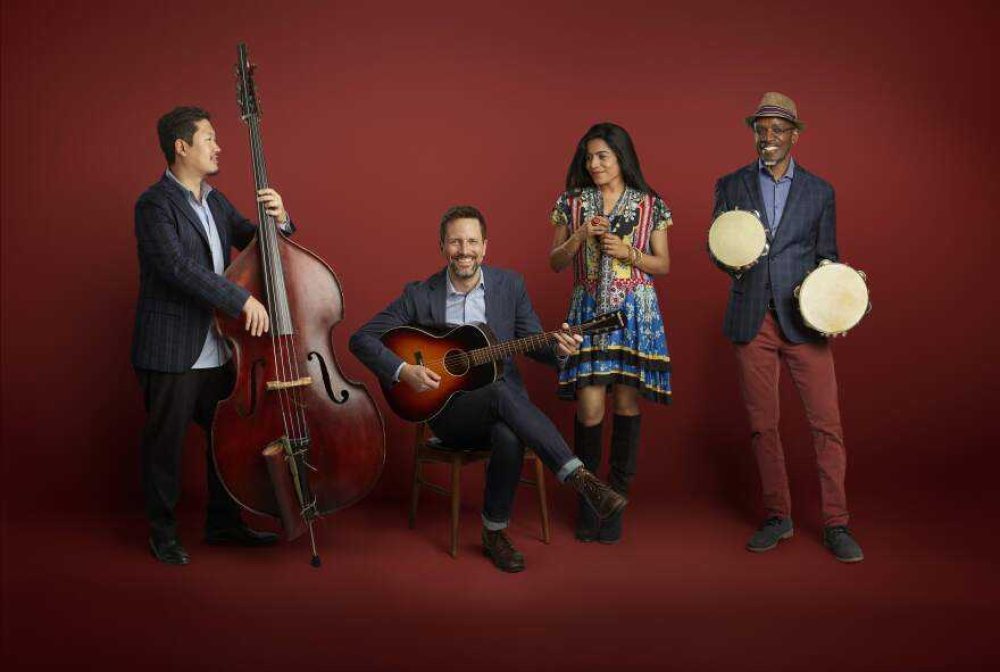
Talk about that.
Yeah, some of those things… I mean, when you're asking those big, complex questions, I think everybody at the end of the day in this group, thank goodness, can come together. Even in the greater society in the United States—because this project is really about diversity in the United States of America—it's a metaphor for us all trying to take the time and energy to see one another in a deeper way and not just in a “Kumbaya” way, to use a Gullah reference. Not just “This is all great. Look how similar we are.” No. We are all profoundly different. We're so different that at times it's difficult.
You must have had some interesting discussions about that kind of stuff with you all coming from such different backgrounds and perspectives.
Navigating interpersonal things is hard no matter what group you're in. And even within your own family that speaks its own familial language. But there are added layers of complexity with music. Things can get misinterpreted or misunderstood so easily. We got to moments where we were able to sort of unpack like hidden meanings and mannerisms and expectations and understandings that we all had. Even the fundamental training of someone like Falu is so different than the three of us. At least three of us in the band had common ground in the jazz tradition, whereas with Falu, we learned that those approaches were just foreign, so we had to find ways to patiently just communicate with one another.
I expect her guru must have been tough on her at times from what I've read about Indian classical music training.
Yes, but in a different way. Just the types of things that she pays attention to in terms of tone, melody, pitch, how much it means to move a note the slightest amount.
Indian music is absolutely the pinnacle of precision when it comes to pitch.
It's pretty amazing. It's a whole world, and the fact that they find that whole world without adding harmony and all the different things that have consumed my musical training. Specifically harmony. I mean, harmony is such a big part of my musical background and everything that I've been interested in in music.
Yes, harmony. Jazz. Certainly.
And so it's wild to try to marry those approaches. I mean, in the end, I'm proud of the result that we landed at. It's a very honest, pure representation of the struggle that we engaged in.
I can tell you worked hard because it doesn't feel strained or forced at all. I imagine it's a whole new challenge to find an audience for this.
We’ve been lucky that a lot of arts presenters and sort of hip listeners who really appreciate music have adopted us and are really getting behind the project. This next tour will be our third season working. We primarily perform at festivals or performing arts centers and theaters. Every year we've increased the amount of work that we've done. The first year we probably did 10 shows and then the next year we did 20 and this year we're gonna do 30.
Hopefully we'll continue to grow. We just put the album out last February. Everything goes so fast, you know? You put five years of your life into making something and then you get two months of people's attention. But I hope this is the type of project that people can discover at any point.
Well, I wish you guys the best of luck. I admire your courage in going for something that's clearly not fitting any existing mold. I suppose the success of Ranky Tanky probably gave you a little bit of confidence in that department.
Yeah, it did. I think at the end of the day, whether you succeed or fail, everything is a learning experience helping to shape your path forward. Whatever you're doing, you have to follow the inspiration.
Amen.
Alright Banning. Thank you, brother.
Related Audio Programs
